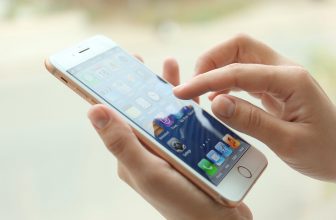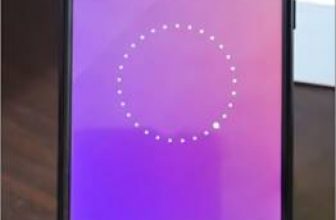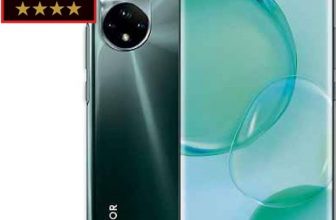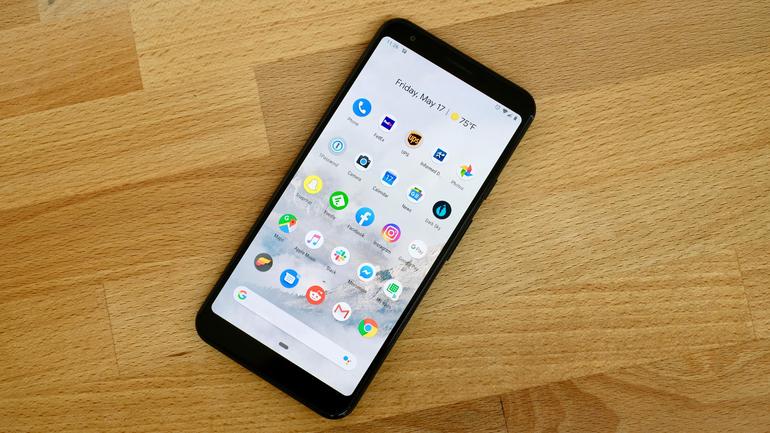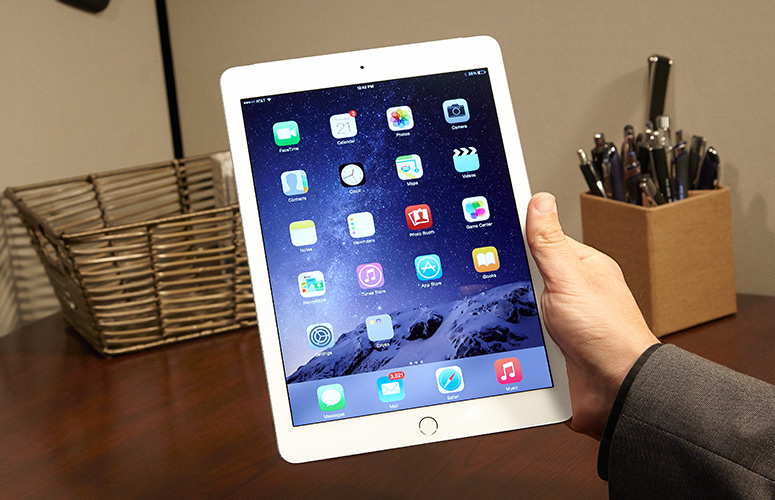
Apple’s obsession with making its iPad tablets thinner and lighter every year is a philosophical statement. The computer should disappear; all that should be left is the app. That’s Apple’s genius, and something Android tablet makers have trouble matching. That’s also what has made the iPad our top pick for large-screen tablets since the first model came out in 2010. The iPad Air 2 has a few key improvements over last year’s version, a couple of which are especially meaningful: a powerful processor and the first multi-carrier SIM card we’ve seen in the U.S. So yes, the iPad Air 2 pushes the state of the art forward, and is a worthy Editors’ Choice.
Table of Contents

PHYSICAL DESIGN
The iPad Air 2 is super slim. At 9.4 by 6.6 by 0.24 inches (HWD) and 15.4 ounces, it’s the same height and width as the previous iPad Air, and just a teensy bit thinner and lighter. Just like the previous model, this one is backed with dun-colored metal (gold, gray, or silver) and fronted with glass (and either a white or black bezel, depending on the back color you choose). The Home button has been switched out for Touch ID, Apple’s signature fingerprint sensor, which now lets you unlock the tablet, buy things online, or log into, say, your Dropbox account with a touch of a finger. Along the bottom panel, the two rows of small speaker holes have been replaced by one row of larger holes. On the right-hand side, the lock switch is gone.
The 9.7-inch LCD screen is the same 2,048-by-1,536 resolution with 264 ppi as the inaugural iPad Air, but it has a new anti reflective coating and it’s been optically bonded. That means blacks look noticeably blacker and colors a little more saturated, although we’re nowhere near super-saturated Samsung Galaxy Tab S levels.
Apple’s existing iPad Air Smart Covers fit the Air 2 just fine. More rugged or tighter-fitting iPad Air cases may not fit, because the camera and volume rocker have both moved ever so slightly.
NETWORKING AND THE APPLE SIM
Apple claims this iPad Air’s Wifi is twice as fast as the previous model’s, with 802.11ac support running up to 866Mbps. The problem there is that almost nobody’s Internet connection is 866Mbps. Still, against a 100Mbps corporate connection with a Meraki MR16 router, we saw pretty much the same (very good) speeds on both tablets.
The big advance here, though, is the Apple SIM— something you couldn’t get in any earlier iPad model. If you buy a cellular iPad that’s outfitted for AT&T, Sprint, or T-Mobile, you’ll get a single SIM card that can be switched between the three carriers’ prepaid plans (and EE, in the U.K.) in the iPad’s settings. The SIM is removable just like any other SIM, and if you buy a Verizon model, you’ll just get an ordinary, single-carrier Verizon SIM in the slot. The single iPad model sold in the U.S. supports all of the U.S. carriers’ arcane bands except one (T-Mobile’s 700MHz Band 12, which hasn’t even been deployed yet). If Apple gets more global carriers on board, this could be a real boon for world travelers.
EXEMPLARY APPS AND PURE POWER
The reason the full-size iPad keeps winning Editors’ Choice awards is that there are whole categories of apps you’ll find on iPads that don’t exist for Android tablets. Or there are under-featured Android versions. Apple is way ahead on creative and productivity apps, for instance. There are Google apps and Amazon Prime Streaming apps. The iPad is the one tablet platform all developers, except the most extremely hacker-focused, consider a must.
Inside the iPad Air 2 there’s a 1.5GHz, 64-bit Apple A8X processor, but don’t listen to all of that gigahertz and bit width stuff, because Apple’s processor design makes for faster performance than other competing devices. The Air 2 scored 63,264 on the AnTuTu system benchmark and 4,580 on the Geekbench 3 processor benchmark, as compared with around 30,000 and 2,863 for the iPad Air, and 35,000 and 2,770 for the Samsung Galaxy Tab S.
On the SunSpider browser benchmark test, the tablet scored an impressive 311.8ms, which is in the same class as the iPhone 6 and iPhone 6 Plus (360-380 ms), and faster than we’ve ever seen Google Chrome operate on any Android device (the Tab S clocks in around 1,000ms).
You can see the power of the A8X with movie exports in iMovie. In testing, exporting a 2-minute movie to 720p took 19.5 seconds on the Air 2, as compared with 34 seconds on the original Air. Wow. But I didn’t see such a dramatic change in other productivity apps. Opening a giant spreadsheet in Microsoft Excel only dropped from 26 seconds to 23 seconds. And resizing 24 photos in the third-party Reduce app took 28 seconds on both the old and new tablets. The iPad Air 2 has a blazing engine, but third-party developers really need to open up the throttle.
The Air 2’s super-slim build means endurance falls a bit short. The battery life of 5 hours, 15 minutes, when streaming a YouTube video over Wifi at maximum screen brightness is about the same as with the previous generation (5:36). Cut the brightness in half, and you have Apple’s estimation of 9 to 10 hours. Neither tablet can come anywhere near the Samsung Galaxy Tab S 10.5, which gives you two more hours of heavy use between charges.
CAMERAS AND MULTIMEDIA
The iPad Air 2 now has an 8-megapixel camera on the back, joining its 1MP front camera. That’s a jump up from the 5 megapixels on the iPad Air, and the main camera now supports 120-frames-per-second (fps) slow motion recording.
Apple has done a good job making sure the front camera takes sharp selfies, though it gets noisy in low light. The main camera has been significantly stepped up from the iPad Air’s camera. HDR mode now works properly, balancing exposures and not blowing out bright skies. Low-light performance is not up to iPhone 6 standards—images are significantly grainier than on an iPhone, although fortunately they don’t blur too badly because the shutter speed doesn’t run lower than 1/15 second.
The video modes now record 1080p video with the main camera and 720p with the front camera, both at 29 to 30 fps indoors and out. There’s no optical image stabilization, but as I found in testing the iPhone 6 Plus, that can be a shibboleth that doesn’t actually improve your image quality if it isn’t part of a larger package of lowlight improvements.
The iPad line has always made excellent music and video players, and Apple didn’t mention that the iPad Air 2 is much louder than the previous iPad Air. It’s easily noticeable when they’re playing the same content.
I wouldn’t call it room-filling, but it’s certainly a step up. At maximum volume, sound doesn’t distort, but the tablet vibrates noticeably.
CONCLUSIONS
But the fact remains that the iPad Air 2 is the best tablet for the most people. You probably don’t need to replace your iPad Air—there’s not enough here to merit the cash outlay—but the drop in weight and improvement in Wi-Fi performance, among other things, make replacing an older-generation iPad with an Air 2 a good idea. If you’ve never had an iPad, the Air 2 is a no-brainer. Unless you have a distinct reason for purchasing another tablet, for example because you really want to use Windows apps or you crave parity with the operating system on your phone, the iPad has more elegant apps than any other platform. And if you’re just looking for “a tablet,” it’s still the default—and for good reason.




